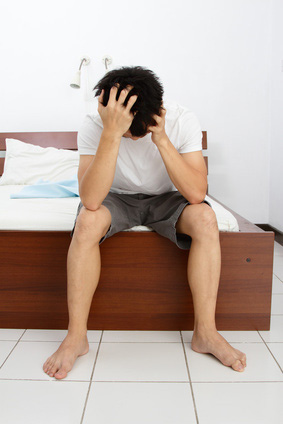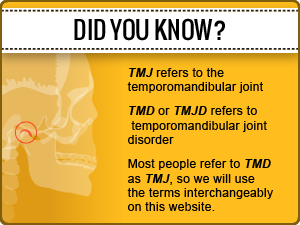TMJ Pain & Sleep
What's the connection?TMJ Pain and Sleep: Why do I have trouble sleeping?
 Do you find trouble sleeping and at the same time have jaw pain? A lot of Americans suffer from one sleep disorder or another but the most common is something called sleep apnea. Sleep apnea occurs when the airways become blocked and you find that you keep waking up as your body reacts to the lack of oxygen.
Do you find trouble sleeping and at the same time have jaw pain? A lot of Americans suffer from one sleep disorder or another but the most common is something called sleep apnea. Sleep apnea occurs when the airways become blocked and you find that you keep waking up as your body reacts to the lack of oxygen.
There are other reasons that can help to stop you sleeping well and these are related to your temporomandibular joint (TMJ). The jaw joints that connect the lower jaw to the skull are the TMJ Joints. When they do not function smoothly you may hear clicking, popping or grinding noises in your joints or experience mild to severe pain when using your jaw. This is the part of the face that allows you to move your jaws up, down or sideways. When the TMJ is not working you may experience locking of your jaws or experience pain with movement.
If your ‘bite’ becomes misaligned you might experience symptoms such as face, ear, neck and jaw pain, because a ‘bad bite’ can affect your TMJ. A problem with the TMJ may then also cause snoring and sleep problems. Your bite and your two TMJ joints act like a three-legged stool, if the legs are even the stool is stable. If one or more of the joints or the bite is not correct you will have instability resulting in problems. Muscle pain, neck pain and headache are some of the most common results of instability.
A jaw joint disorder could be causing your sleep problems
If you have a problem with your TMJ, then the pain could cause a TMJ related sleep disorder. The link between your TMJ and some sleep disorders like sleep apnea is crystal clear, but just the jaw pain may still prevent you from getting a proper night’s sleep.
TMJ problems are often caused by a misaligned bite, which can put your tongue in the wrong place so that it readily blocks your airways. If you snore a lot and cannot sleep because of your TMJ, you do need to find a remedy because it could lead to more serious health issues, including heart disease and high blood pressure. A sleep disorder is more than a lack of sleep as it is a warning that further health problems are possible if treatment does not start.
The National Heart Lung and Blood Institute of the NIH published a report on “THE CARDIOVASCULAR AND SLEEP-RELATED CONSEQUENCES OF TEMPOROMANDIBULAR DISORDERS” I wrote a paper for Cranio Journal titled “TMJ, The Great Imposter has a Co-coconspirator Poor Sleep” I was requested to write the editorial for Cranio by Riley Lunn, the editor and owner when the Journal changed it’s name from the Journal for Craniomandibular Practice to the Journal for Craniomandibular Practice and Sleep.
Sleep problems can cause a multitude of pain Disorders including Fibromyalgia
It does not matter if jaw pain or airway problems are causing your disturbed sleep. Once you sleep is disturbed it creates a host of new problems with widespread muscle pain. There is a very specific sleep finding in Fibromyalgia, Alpha Intrusion into Delta Sleep or in simple English you wake or have disturbed deep sleep. Studies have shown that many patients have Fibromyalgia symptoms if you disturb their sleep. The disruption in sleep also alters our endocrine system affecting insulin resistance, cortisol levels, growth hormone, adrenal function, sexual hormones and thyroid hormone. All of these factors can increase the pain and dysfunction associated with TemporoMandibular Disorders.
Dental treatments for your jaw problems and sleep disorder
This may be the right time to consider dentistry to correct the TMJ problem and any sleeping disorders, too. We will first ensure that no other health problems are causing your TMJ problem and any other sleep disorders. The first test we might use is an ultra low-frequency electronic device which will relax the muscles in your face. Many patients have comorbid conditions or health problems that contribute to their TMJ disorder but there are also many patients who experience a host of medical problems because of their TMJ disorder. One study showed that patients with TMJ disorders have a 300% increase in spending in every field of medicine.
If your TMJ is the culprit, then a special orthotic appliance is put in place which prevents the bite misalignment. If teeth grinding (bruxism) seems to be the main reason for the TMJ disorder, fitting a night guard is quite likely. This is a custom-made mouthpiece that you will wear when you sleep. These treatments can lead to less pain and better breathing. Many patient who grind their teeth have sleep apnea and the bruxism helps to stiffen and open their airways. Sometimes, a troublesome behavior can have both positive and negative consequences. It is extremely important that patients with sleep problems and/or TMJ problems always see an expert in both fields.
Dr Shapira is a Diplomat of the American Board of Dental Sleep Medicine, A Diplomat of the Ameican Academy of Pain Management and a Felllow of the International College of CranioMandibular Orthopedics.
Stop the pain and get back to sleep
If you have been experiencing jaw pain and find it hard to get to sleep you may have a problem with your TMJ which could be helped by physiologic dentistry combined with Dental Sleep Medicine. We will need to make a thorough examination and eliminate other possible causes of the pain and any sleeping problems you have been experiencing. By utilizing advanced clinical and diagnostic protocols available in modern dentistry techniques, Dr. Shapira will be able to help you find a night filled with better sleep and a reduction or elimination of your daytime pain.


0 Comments